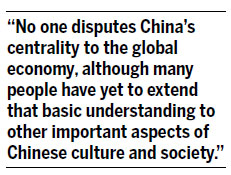At the recent World Economic Forum at Davos in Switzerland, China was an underlying theme, not just in sessions with China in their title, such as China Outlook, but in many other discussions about energy, climate change, innovation and global economic growth. Davos 2014 confirmed that China's global role now seems to have gained universal acceptance.

One set of discussions at Davos, in which China featured prominently, was those concerned with global risks. The deterioration since 2012 of China's already difficult relationship with Japan following the dispute over the Diaoyu Islands, to a position where neither side seems able to modify its position, is causing widespread alarm around the world.
The reference at Davos by Japanese Prime Minister Shinzo Abe to the sudden start 100 years ago of World War I was countered by Chinese Foreign Minister Wang Yi and the head of China's largest bank, ICBC Ltd, with a recital of the history of Japanese aggression in eastern Asia.
Given the well-documented Japanese aggression in the 20th century in China, an agreement to disagree between China and Japan seems to depend on a modification of the present Japanese position. The United States, with its strong influence over Japan, seems to be the only neutral party which can bring this about. But can a US government, weakened by internal dispute and focused on withdrawing from costly military commitments be relied on to play this vital role of mediation between the two main East Asian powers? It's no wonder that concerns at Davos over the China-Japan impasse were elevated.
From listening to the discourse at Davos, you would not know that China was years ahead of the West in Internet and mobile applications, or that China's ancient history and rich culture may hold answers to some of the problems that plague today's world, from acupuncture to Zen Buddhism.
But you would know that China has played a vital role in global economic growth since the financial crash in 2008 and you would be led to expect that China's economy would go on driving much of the growth on which employment and living standards will depend in countries around the world, from Chile to Iceland. No one disputes China's centrality to the global economy, although many people have yet to extend that basic understanding to other important aspects of Chinese culture and society.
This was the first Davos meeting since 2007 not to focus mainly on the financial crash, its causes and its aftermath. With developed countries' economic prospects for 2014 looking better than at any time since 2007, the need for structural economic reform replaced economic survival as an important theme.
Christophe Margerie, the chairman of French oil company Total SA, put it well when he said that Europe could not go on complaining about competition in traditional industries from the emerging world. To succeed in the global economy in the presence of new competitors from the emerging world, Europeans would have to use their technological and other advantages to develop new kinds of products and services. In the US, recognition of a slow economic recovery in 2014 was muted by discussion of the weakening of the country's superpower status and the unlikelihood of an agreement being reached by the Congress lawmakers to reverse fiscal imbalances.
By contrast, the Davos discussion on China's economic outlook heard a strong vote of confidence in the government's ability to execute the broad, far-reaching China reform program from Zhang Xiaoqiang, vice-chairman of China's National Reform and Development Commission, the country's top economic planner. This was important because the optimistic economic projections from the other participants on the China Outlook panel depended on the successful implementation of the reform projects outlined at the Party's Third Plenum in November.
As one session after another lifted delegates' eyes from the crisis to look forward to the post-crisis world, one theme recurred again and again: the acute need for global leadership thrown up by the US' global withdrawal, as a consequence of national financial constraints caused by excessive budgetary commitments. If the US cannot play the role of global superpower any more, how will the world be governed? What global governance structure will rise up to replace the Washington Consensus?
Some referred hopefully and vaguely to the China-US strategic alliance as the new core of global governance. But no one at Davos was far-sighted or brave enough to discuss the new global order and how it is going to function. It seems that it's still too early to convert a recognition that, since 2008, the world has changed profoundly, into a global consensus that the new world needs reformed institutions.
Perhaps that's something for Davos to address in 2015.
The author is a visiting professor at Guanghua School of Management, Peking University. The views do not necessarily reflect those of China Daily.
